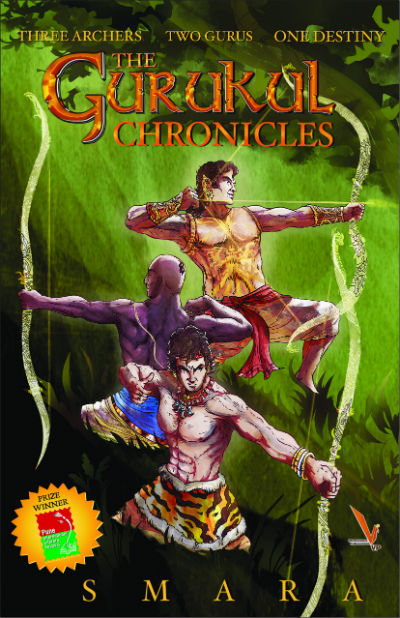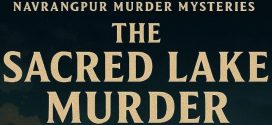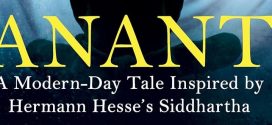We firmly believe and often said that the Mahabharat (aka Mahabharata) is the most inclusive epic known to the mankind. It has all the types of problems, relations, situations, love, hate, generosity, rivalry, and all the other aspects of the life we can think of, are explored in depth.
It thus fascinates authors and writers to get inspired from it and tell stories based on that. It is not enough, though. Every accomplished writer who has admiration for Indian mythology, wanted to tell-retell the tale of Mahabharat in his/her own way. Some of them decide to setup the characters in the modern environment while the others talk about those characters by letting them function in their own time.
This great epic first narrated by legendary Krishna Dwaipayana Vyas (aka Ved Vyas) is a master piece which is not less a than a text for any writer. Late Harilal Upadhyay (a Gujarati author) have tried to stick to the original popular version of Mahabharat in his Mahabharat book series which is comprised of 7 books. Well known mythologist Devdutt Pattanaik came up with Jaya which is an illustrated retelling of Mahabharata where he tried to take a note of some of the less known tales from the epic.
Deepak Kaul have tried retelling the Mahabharata as a comic book named Corpokshetra, where the characters are setup in current time. Prem Panciker tried to explore Mahabharata from Bhimsen’s point of view in his book Bhimsen. Author Christopher C. Doyle has tried it to setup in modern environment where traces leads to the original epic’s time in his The Mahabharata Quest series.
Recently we find some traces of Mahabharata in a Hindi Book Avyakta Kamala by Satyendra Dhariwal. A young and aspiring author named Hariharan Raju made his debut through a book named Barbarika, which is a SciFi novel.
So, when Radhika Meganathan approached us to inform about her book named The Gurukul Chronicles, and we found that it has its root in the Mahabharata, we didn’t wonder. We were rather quite amused and curious to read it and explore the author’s vision about the epic, and which part she have explored. Fortunately, I got a chance to read this book from our team, and I am quite happy for that.
| Book Title | : | The Gurukul Chronicles |
| Author | : | Smara (Radhika Meganathan) |
| Publishers | : | Vishwakarma Publications; Published: (October 12, 2017) |
| # of Pages | : |
234 (Paperback) 358 KB 200 (Kindle EBook) |
| # of Chapters | : | 21 |
| Purchase Link(s) | : |
Let us take a look at the book cover page:

The Gurukul Chronicles by Smara (Radhika Meganathan) – Book Cover
The Gurukul Chronicles refers to the stories of 3 archers who are important yet are not considered as protagonists in the main tale. So, the book cover showing illustrations of 3 archers all pointing to different directions; makes it attractive and informative at the same time. On first glance it gives you an impression of children special comic book kind of stuff.
This Is Here In For You
Book Plot:
As the book explores the story of 3 archers, it is distributed in 3 segments, each one exploring the story of an archer. Each segment contains 7 chapters, so comparatively enough footage is given to each of these archers :).
The Hunter’s Quest
It is the story of most unsung hero of Mahabharat. He comes on the canvas of the main story for a very limited time, and yet, with his dedication, bravery and skills, he creates a mark which even the best archer of Mahabharat cannot outshine.
It is the story of Eklavya (aka Ekalavya) – the Nishada boy.
The story or rather we say two important segment of Eklavya’s life are well known:
- Ekalavya arriving at the Gurukul of Drona to seek education from him.
- Upon asking for the GuruDakshina, humble, generous and brave Ealavya cuts his right thumb and gives it to Drona, without hesitation.
So, there is nothing much to tell about these incidents.
However, Ekalavya’s life was much more than these two life changing incident. The story here starts with Ekalavya, fondly called as Eka’s childhood. His father met with his death and his mother is now married to his uncle, the chief of the village.
One day, his uncle went for hunting in the jungle and he returned after a few days! He was very tired and not in the best of his health. Eka, was not very keen to be the chief’s assistant (a kind of crown prince) and eventually, the next village chief. He, like his father, wanted to become a warrior, not a mere hunter. There is a girl in the village, who used to admire him, and he too had soft feelings for her.
Considering the request of time, Eka’s uncle declared the person who he chose as his assistant!
And, it lead to the consequences which changed the fate of Eka.
The Charioteer’s Son
In the last scene of Eka’s story, he meets with another remarkable archer from Mahabharat, Radheya (aka Radhey) who we later comes to know that is actually the eldest Pandava, Suryaputra Karna.
They both meet in an interesting way. Strangely, Karna’s life also has a connection with Drona. As, Drona promised Arjuna to make him the best archer in the world, he refused Eklavya, and eventually, he was not ready to let the son of a charioteer also learn in his Gurukul!
Karna, has no other way but to seek for a guru who can teach him the conbat skills and weaponry, especially, the archery! He also, didn’t want to live life of a charioteer, but wanted to become a warrior! And, thus, he needs a guru who, if not better than Drona, than at least be of his caliber. And, he came to know about ParshuRam.
How he meets Parshuram and how the things lead to the incident when he got a curse from Parshuram is explored in the rest of the story.
The Acharya’s Heir
The chariotter’s son, Radheya, meets Acharya’s heir at Parshuram’s Gurukul. He was his (only) classmate. Knowing that Drona, despite loving him more than anything, will not make him the great warrior, precisely, the best archer, as he promised it to his favorite desciple, Arjun (aka Arjuna), Ashwatthama, lost hope to get the best training from his father.
Why Drona want a different life for Ashwatthama, was not matttered for him. Actually, he don’t have that much understanding too. He has only one mabition and that is, to become a warrior!
So again, there is a person who wants to become a warrior and not carrying forward his father’s profession (teaching, in this case) and he see no hope in Drona giving him that education! He too went to Parshuram to learn warfare.
He developed a bond with Karna there.
Eventually, all three archers move ahead in their life sharing a good rapport with each other, having a common goal, to become a warrior, and having a common link, Drona!
The stories are better to read, telling more than this will not be spoiler-free!
This book has won the manuscript contest at Pune international literature festival in 2016 and was published in August 2017 by the literature festival’s publishing partner Vishwakarma publications.
On the whole the book has a substance, and the way the stories link each other, is really fascinating. Delving into the possible lives, especially the unknown but important segments, of these mythological characters is a touch job, which the author has accomplished nicely.
The author has the imagination power, and even more importantly, she mastered the art to pen it down effectively. The characters are growing gradually and we see each of the layers of their respective personalities unfolds in interesting and convincing manner. The way the author has linked the tales and makes the protagonist meeting each other is simply adorable. Same way can say about the chemistry between them.
Another good thing the author did is, she made the characters having grey shades rather than paining them pure black or white. Even, the psychology behind Drona’s actions is attended briefly. So, the author doesn’t try to paint anyone as an antagonist, rather the circumstances played in or against the characters.
The natural beauty, the people’s way of living and warrior skills, training and tests, are explored very nicely. The author’s love for the nature, education and moral values is evident in her writing.
Let me share some inspirational lines from the book:
There is no ordinary humans, Aswathama. Every human has the capacity within for doing great good and great evil.
Life begins for those who take that risky step forward.
You cannot hope for everything to come to you.
Even the Gods leave way for those who follow their hearts. One day, you will suffer for it – no deed, good or bad, is without consequences – but for now, you’re safe and entitled to a peak into the future.
At the same time, the author didn’t miss infusing wisdom in her writing. Here are some such lines:
What is education but the change of all things familiar?
The one who volunteers without expecting advantages in the one who often is blessed with them.
Death, in spite of being such a regular visitor, still manages to scare everyone, including me.
But if you want an education, you cannot get it here – seek it from wherever you think it is, but do not forget, you have everything you need in yourself.
But in life, especially when following your dreams, you should not be worried about other’s disappointment in you. Otherwise, one fine day you will be disappointed in yourself, your family and with the entire world around you. And that’s far worse than anything else.
Freedom, though, does not equal wisdom.
People readily seem to believe what’s outside, even if they have never bothered to look inside.
When your heart is sore, there is nothing that gives you the solace you need as gentle as a tree.
There cannot be one best man in the entire world. There’s always someone better than you.
Here are some interesting lines from the book, which will give you the idea about the quality of writing you can expect from the book:
It took me a moment to realize that I was being praised. It felt… strange. Hunter children do not get praised. How can you praise the bird for flying, or the fish for swimming? A hunter’s duty is to hunt. If we do it well, then that’s nothing to be praised for. It is what we live for.
It is dark.
Then I realize it’s so because my eyes are close. I open them cautiously and still the darkness persists, now accompanied by a stench to nauseating I almost retch.Revenge is terrible business, Aswa. It takes over the senses, it blinds your faith, it destroys your good intentions, and it is the poison fruit of an ancient and ugly tree. Whoever commits to the task of revenge, take a one way path to bitterness and despair.
When one is looking for the truth, he is forced to hunt for it through a maze of lies and deception and conflict, and its is very easy to lose sight of what’s important.
The forest never sleeps, but during the rain, it rests a bit. Just like any other beast.
Various emotions are explored by the author quite effectively in the book:
Why do people change as you become older? Things were so easy when I was a child.
It’s always the same, he thought, the many against the mighty.
How dare he ask the question that I should have asked?
These elders. They think they are protecting you, but all they are doing is delaying the impact of the hammer.
People, as I had learnt long ago, do not tend to notice their less-than-perfect brethren.
Even if my stomach eats itself in hunger, I cannot consume anything in this part of the jungle.
And yes, a book without humour / sarcasm proves dull writing, right?
… Ah, who should speak now but the one intent on being in the limelight? (About Yudhishthria).
Let us forget about the spellings of some character names, as we know that in various segments of India, “s” and “sh”, “t” and “th” are written differently, based on the dialects there. So author’s growing up, makes her pronounce some names that way.
Also, there are different versions of folklores and sidetales from various epics are popular in different states of India, so people might grew up reading different versions of the same story. And, then the author adds her imagination and fantasy to imagine additional incidents. So, when you read the book, there are some such things come to you attention, and you need to ignore them, for a smooth reading experience.
The author got several things quite wrong, which you may think that should have been worked out properly. For example, at many places sh refers Bheeshma, the Kuru regent as Bheeshmacharya! Bheeshma was the eldest living member of his clan during the time, the story is setup, and he was respected by all, and fondly referred as “Pitamah” (aka grand father), but never an acharya. Acharya, is a salutation for the teachers and Gurus only. So I cannot digest it. Same way, she refers Kripi as the daughter of Kripacharya! As per the main story they were siblings! I am not sure, if there is any version of Mahabharat popular in any local dialect which refers the same, but, it is definitely not that way in the main story.
I also don’t find the description of how Eka’s father was caught, quite convincing. It seems coming hurriedly. The main problem I faced while reading the book is the formatting. The file for the Kindle provided to me is having hard line breaks and page footers. Thus the lines are flowing properly in portrait and landscape both the modes. The page footers are hardly placed so when you read the book, they often come between the page content. It is quite possible that the original kindle version of the book may not have that problem.
There are some lines which I found have spelling/grammar mistakes, or could have written in better ways.
“Is that what you think of me?” she asks real quiet.
“Oh, where you expecting someone else?” says Shara, smiling maliciously.
I feel ashamed of deceiving them. Bu it’s too late for recriminations.
You may be the power ful one now, but father always told me that time is more power than any mortal.
“it’s no use overthinking,” I tell her.
So, despite the book being a real treat for mythology lovers, there is a large amount of scope of improvement. The characters are strong and there is no gender bias in their exploration. As there is no adult material, the book can be read by everyone who can understand it. It is a really worth mentioning attribute, as even popular writers doesn’t keep such temptations at the bay.
Summary:
A nicely written, gripping book. If you love reading mythology, you will surely love reading this book. It is a quite a fresh take on some unexplored / less explored stories from Mahabharata.
Around 7.5 to 8 out of 10.
Quick Purchase Links:
- Buy Book From Amazon India – Kindle EBook
- Buy Book From Amazon US – Kindle Ebook
- Buy Book From Amazon India – Paperback
- Buy Book From Amazon US – Paperback
If you already have read the book do share your remarks and thoughts via comments below. Does this review help you in making your decision to buy or read the book? Do not forget to share this article with your friends over various social networks via Twitter, Facebook, Google Plus and others. And yes, you may like to subscribe to our RSS feeds and follow us on various Social networks to get latest updates for the site to land right in your mail box.
 ThinkerViews – Views And Reviews Personal views and reviews for books, magazines, tv serials, movies, websites, technical stuff and more.
ThinkerViews – Views And Reviews Personal views and reviews for books, magazines, tv serials, movies, websites, technical stuff and more.



